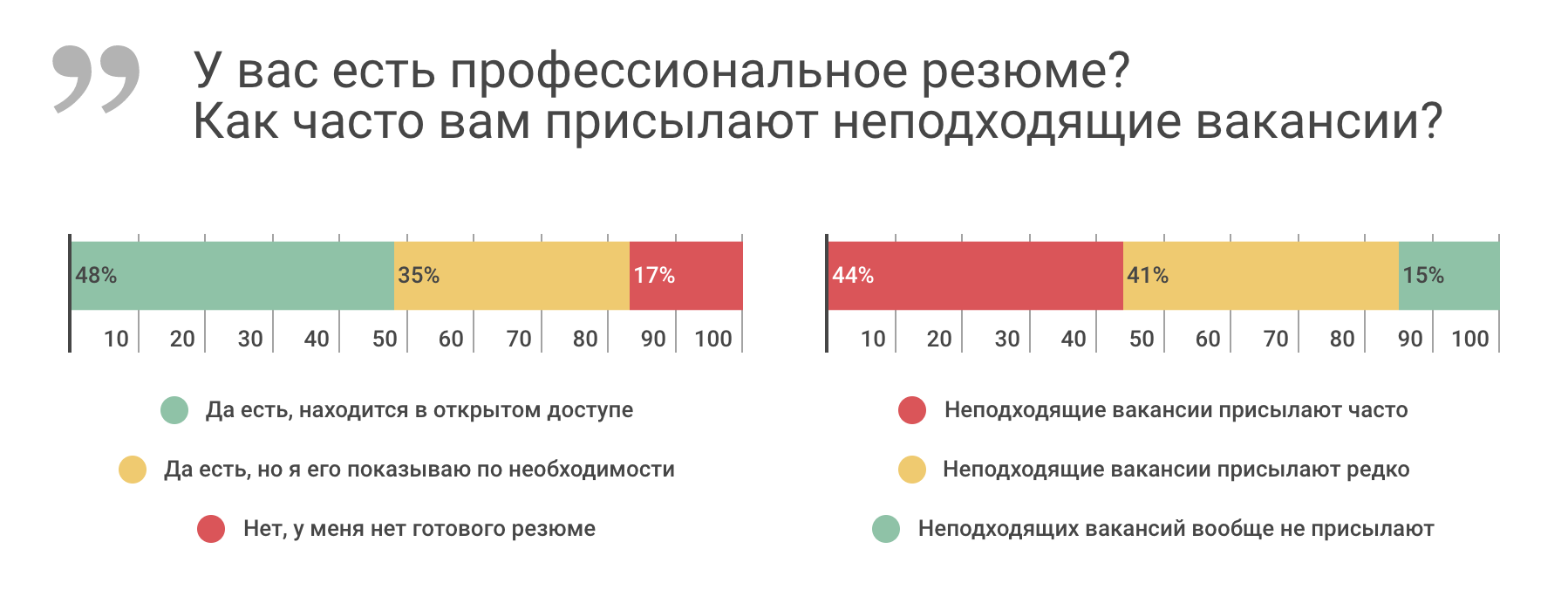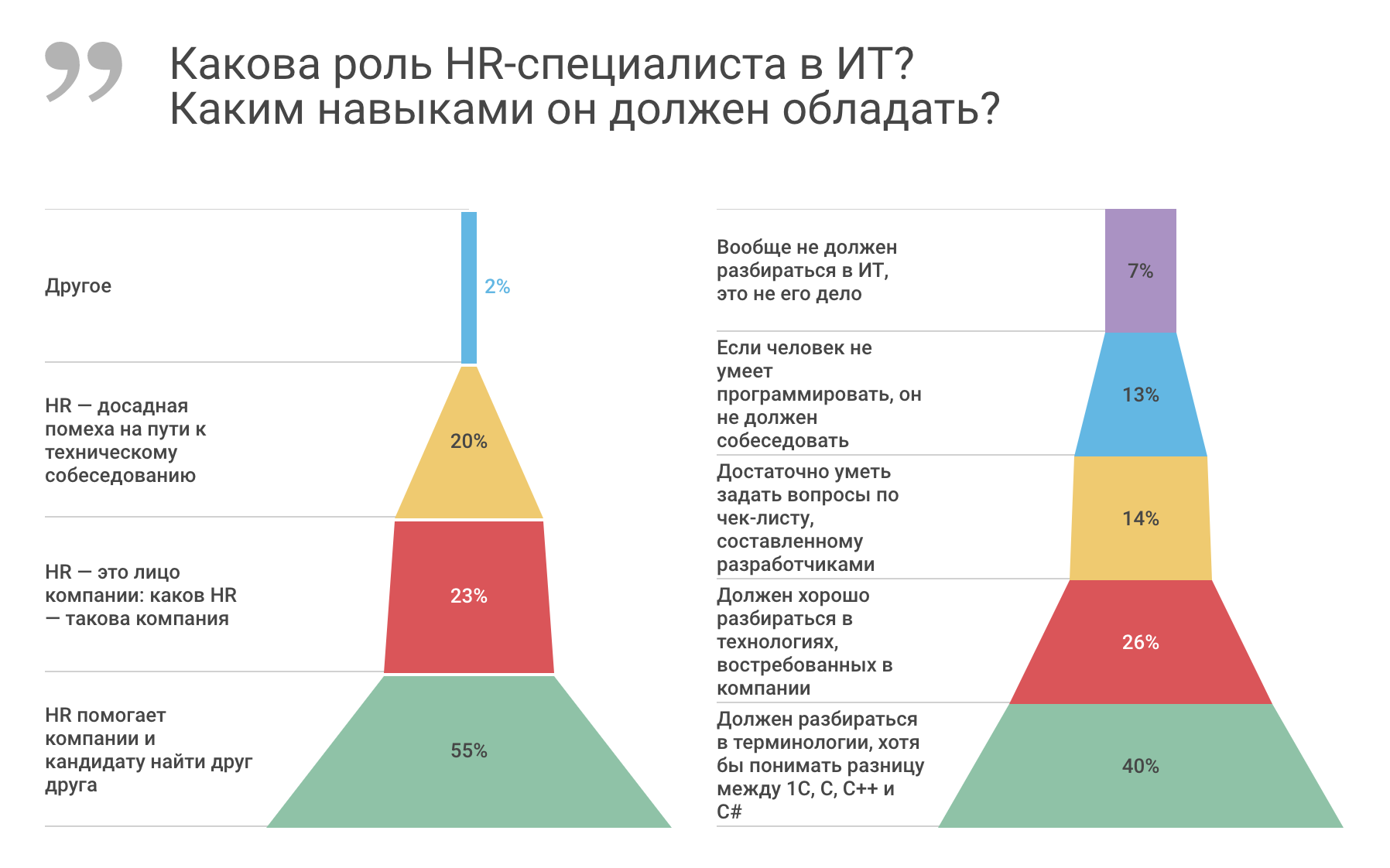The process of hiring through the eyes of developers: the results of the survey “My Circle”

We decided to find out how developers are currently hiring and how ideally they should be. We conducted a survey on this topic among the users of “My Circle” and “Habra”, received more than 1100 answers and now we publish the results.
The hiring process always follows a more or less common scenario: searching for a specialist, inviting him to a job, performing a test task, and interviewing. In our survey, we went through all these stages and tried to see each of them through the eyes of the developer.
')
We hope our small research will be useful for recruiters who are fighting for developers today, in their difficult but noble cause!
Audience portrait, developer market

So, more than 1,100 people took part in the survey. As you can see, these are mainly IT technical specialists: developers, testers and administrators, about 84% of them.

It is curious that every tenth temporarily does not work (11%). At the same time every fourth job seeker (24%). These specialists are actively searching, looking for vacancies posted by employers and responding to them.
Most developers (61%) are not looking for work, but they are open to suggestions. These specialists most often do not show any particular activity themselves, recruiters find them and make offers.
And only 14% of specialists are not looking for work and are closed from offers.
Total, to the new work openly overwhelming majority (85%) of developers.

It turns out that only half of the developers have professional resumes in the public domain. Another third have such resumes, but they give them only as needed. Every sixth person has no summary at all.
For recruiters, this means that before they come into contact with a potential candidate, they can get acquainted in less detail with only half of them. So their search and suggestions will be less accurate than they could be.
In more than half of the cases, unsuitable jobs are not sent or are rarely sent. However, in almost half of other cases, inappropriate jobs are sent. What upsets the already difficult process of finding each other: the employer and the applicant.
Part of the responsibility for this lies, of course, on the recruiter, who could not immediately understand whether this vacancy would be of interest to this developer or not. But another part of the responsibility lies with the developer, who did not bother with his public resume.
Recruiting, job offer

A quarter of developers have never received offers from recruiters. Another quarter receives offers once a week or more, a quarter more - 1-2 times a month. And the remaining quarter - every few months or less.
Almost half of the developers (45%) prefer to communicate by mail. Every fifth prefers messenger. Another one in five is a telephone.

As we have seen, more often than not, developers themselves do not respond to vacancies, but receive offers from recruiters who have found them. Moreover, in large companies, recruiters have to communicate with hundreds of developers in only one position. It turns out that recruiters are the first to speak on behalf of the company. Often, the developer remembers the recruiter much longer than any other company that made him an offer.
In this regard, recruiters act as a live advertisement for the company's HR brand. Communicating with developers, they perforce verbally transmit to him the values that are in the company at the moment. From what the developers draw the appropriate conclusions.
Only every fifth developer agrees with this. Half of them consider the recruiter to be just a simple intermediary, connecting him with a potential employer. Also, one in five considers the recruiter to be an annoying hindrance on the way to the interview.
Most (40%) of developers believe that a recruiter should just be well versed in IT terminology. Every fourth believes that he still needs to be well versed in the technologies adopted by the company. Every fourth person doesn’t care about the technical knowledge of the recruiter: afterwards, either a check list from the company's developer is enough (14%), or there’s nothing at all to know about technology (7%).
At the same time, 13% impose the most stringent requirements on the recruiter: if you don’t know how to program, you shouldn’t talk in any form.
As a result, we see that the majority of developers (66%) expect from the recruiter basic knowledge of IT technologies in general and in the technologies of the company, on behalf of which he acts, in particular.

As you can see, the majority of developers (72%) for the creative submission of vacancies.
The most important thing in a job, for the vast majority of developers (75-80%), without which they will not even respond to it, is a stack of technologies, working conditions and wages. For half (50-55%), the project and the type of the company's activity are no less important.
By the way, at one time we conducted a study in which we found out that developers are ready to change work without a salary increase, and the same factors are the main motivators: the technology stack, the project, the type of activity of the companies.
Also, we have already talked about how important it is to indicate salary in vacancies. Its size is not important, the fact of its presence in a vacancy is important. Vacancies without salary are 30-50% less frequent.
An open-ended question: “What job will you definitely not respond to?”
We asked respondents to answer this question independently in free form, reviewed and processed all the answers, and this is what we got in the end.
Most of the respondents will definitely not respond to a vacancy that does not suit them; specialization, technology, geolocation and other significant factors were indicated as evaluation criteria.
In addition, respondents gave other reasons, in decreasing order of importance:
1. Poor vacancies, including:
- presence in the job description of grammatical and semantic errors
- copy-paste template jobs
- the absence of a salary fork is also not credible when the lower and upper limits of the fork differ by 2 or more times
- lack of information about the project in which to participate
- lack of information about the technologies to be used, or a contradiction in such information
- lack of information about the company, also when the company does not have a website and mention of it on the Internet
- fuzzy description of duties
2. The second most important factor was the discrepancy between the level of the proposed salary and the level of requirements, while the high requirements for knowledge and work experience and the low salary relative to their salaries, as well as the high salary in the junior position, look suspicious.
3. In third place is the reluctance to work with outdated technologies, as well as Bitrix and 1C technologies.
4. In addition, applicants pay attention to the scope of the company and do not want to respond to vacancies of companies whose activities are considered suspicious and socially harmful.
Also negative factors are gray salary, tight schedule, dress code and processing.
Test items

Half of the developers believe that the test task before the interview will not hurt, as it will provide an opportunity to demonstrate their skills. At the same time, every third person considers him superfluous, as it relies more on a technical interview. Every fifth person considers the demonstration of his code the right method of evaluation.
Most see this or that benefit in the test task, but one in five still considers it an unpleasant necessity.
In general, the developers are not against the test tasks, but many of them still consider only the technical interview or even the code being demonstrated important.

The overwhelming majority believes that the test task should take no more than a few hours or one evening. Every sixth faced a situation when the test task was paid.

A fairly large proportion of developers have concerns that the company will use the results of their test task without demand. Probably, payment of the test task would be a good solution to alleviate these concerns.
Job interviews
An open-ended question: “How do you think, how should the interview be held so that you can evaluate your professional skills?”
1. The majority of respondents believe that the optimal format is a discussion of the candidate’s previous experience, including which projects he participated in, what technologies were used in them and why, what were the problems and how they were solved.
2. In second place is an informal conversation with the employer, where both parties can ask questions that interest them. Respondents explain that in addition to the candidate’s professional knowledge, it is important to assess the candidate’s compatibility with the future team and leadership, coincidence of life values, thinking peculiarities, decision-making methods, and many other human factors that can be tested only in the live communication format.
3. The next most popular variant of answers is to discuss the practical task related to the project of the employer, to offer a conceptual scheme of the solution, architecture, and technology. Respondents note that a dialogue with the employer is also important here, so that he may comment on the proposed solution. It is also possible that the employer tells his solution to the problem and offers to improve or comment on it.
4. In fourth place - a demonstration of the code previously written by the candidate, a discussion of the technologies and solutions used.
5. Tests, checklists and theoretical questions occupy only the fifth place in the list of ways to assess professional skills.
6. The next in the list is the execution of the test task with the subsequent analysis before or after the interview or a small test task directly at the interview.
7. The last place is occupied by algorithmic and logical problems.
An open-ended question: “How is the interview going, what will be an unequivocal argument for you against working in this company?”
1. The overwhelming majority of respondents noted as a decisive factor against applying for this job - rudeness and rudeness on the part of company representatives, arrogant and disrespectful behavior, inadequacy of interviewees, as well as lateness.
2. The second most important were the incompetence and lack of professionalism of the company representatives.
3. The next in importance was the assessment of professional knowledge and competence of candidates using tests, checklists, algorithmic and olympiad tasks, as well as “logic” tasks. Respondents believe that all this is not related to the real work of the company and therefore cannot be a criterion for selecting candidates.
4. In fourth place - avoiding the answers or unclear answers to the direct questions of the candidate.
5. Further, the sample questions from HR type "Who do you see yourself in 5 years?", As well as too personal questions that are not related to work.
6. Changes in essential working conditions, for example: salary, position, list of duties, work schedule - in comparison with information in a vacancy or with conditions stated at previous stages.
7. The last place is to write the code on the board or on a piece of paper.
In addition, respondents point out as factors that can push them away from hiring - a very long interview, many stages of interviews, a large test task, chaos and confusion in the company, tired and scattered representatives of the company.
Main conclusions
1. Market. Proposals from recruiters for a new job openly the vast majority of developers. However, only half of them took care of their professional resume in the public domain.
2. Jobs. Developers welcome the creative description of vacancies, which must necessarily include: technological stack, working conditions, salary, project and type of company activity.
3. Recruiter . From the recruiter, offering a job, the developers expect basic knowledge of IT technologies in general, and in the technologies of the company on whose behalf they act. The developers consider the recruiter to be an assistant in the search for interesting work, and many look at them as the company’s face.
4. Test items. The developers are not against the test items, but many of them still consider important only a technical interview or even the code itself. The test task should take no more than a few hours and be paid.
5. Interviewing. An interview is a reciprocal process in which not only the employer assesses the candidate, but also vice versa. It is important to discuss not only the past experience of the candidate, but also to make him feel the current tasks of the company, try to solve them together.
In preparing the diagrams, we used the service infogr.am
Source: https://habr.com/ru/post/340836/
All Articles